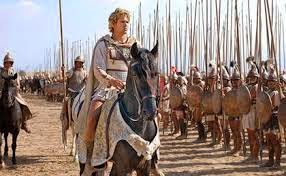 |
| Mission Darius |
The conventional army loses if it does not win, the guerrilla wins if he does not lose.- Henry Kissinger. Conventional war is more like shadow boxing in
the war-room but fighting in the battle field is another story. History is witness of many such
encounters where numbers do not count, the myth of 300 Spartans defying the
mighty Persians, millions in number still fresh in our memory. While Alexander,
was framing his war plan in Gaugamela against the
Babylonians, even his most trusted generals doubted his ability to conquer over
a conventionally mightier Persians. History repeats itself, while skeptical
Babur invaded Afghan king Ibrahim Lodhi, in India, he took a leaf out of Alexander's book. The Mogul king
was leading a smaller army in comparison but capable
of Guerrilla warfare right on the war front. Legends say had the Afghans
or the Persians sustained on the battle field for even another hour or so both
Babur and Alexander would have got an unceremonious burial in the
same battle field, conceding a crushing defeat.
 |
| Behead Ibrahim |
The Macedonian king had his guerrilla strategy ready with his own elite cavalry regiment
on the solitary mission to slaughter Darius and parade
the beheaded King to coerce the opponent to retreat. Though
Darius fled, Babur succeeded but in both the cases the aggressor inflicted
a humiliating defeat on the rivals. Babur too surprised the Afghans
with the maiden use of cannons, the fireballs and its devastating impact caused
immense moral down in Afghan camp. The take away from these medieval
stories, when you can't match up in conventional warfare, fight unconventionally. In the recent past when Indian kings were fighting with
swords, and spears, the outnumbered Britishers used guns and the rest is
history.
Despite my fundamental disagreement with Nazi-Hitler's approach towards Jews, I bow down before his astute military acumen. Unless US, UK and USSR joined hands
together, Germany would have never been
defeated. Post WW-I, Germany was incapacitated and international sanctions prevented them from
rebuilding military strength. Germans could have never measured up to the naval
strength of its European rivals. However, Hitler thought otherwise, instead of
building huge ships to match up with UK's capability, he
focused on building small torpedoes and submarines in
hide-outs. His ability to think as an unconventional military strategist helped
Germans in destroying opposition defense with unconventional weaponries. Let
that be armored tanks, fighter air-crafts and cruise missiles, the
Germans always had an edge in the conventional warfare.
 |
| Dispose off |
Coming back to 21st century realities, the Americans were never in a war zone for long time so were the Africans,
honestly, the latter could not afford one. After fighting 2 world
wars, the Europeans have a new found bonhomie not to wage any more wars
on each other. So Asia is potentially the
battle ground for any future war, with a host of super powers at loggerheads
for own supremacy. Post WW-II the US with NATO and Russia with erstwhile USSR nations pushed arm
race for almost half a century. The usual victims are the poor, under developed
countries fighting a proxy war induced by these world war veterans to dispose
of their rusted stockpile.
 |
| Import vs Exports in Million USD |
Let us examine worlds' largest producers and exporters of arms
and ammunition vis-a-vis largest importers. The arms manufacturers
are in fact economically more secured and posses no immediate threat
from any external countries but they thrust panic in buyers mind for their sole
commercial interest. Interestingly, the buyers panel has most
representation from Asia, justifying the future war zone theorem
mentioned earlier. Even after the colossal collapse Russia still reigns as world
number-2 though its potency is subject to war test. The emergence of China
has challenged both the existing super powers, almost replacing Russia from its position in
a friendly match. In fact Russia has no problem in China calling the shots in
this region as an old communist ally. This simple
fact completely changes the regional power dynamics, as the likes of India and Vietnam the old USSR partners no longer
insulated from Chinese imperialism.
 |
| Russia Down Down!!! |
Although, India maintained a middle
path pioneering the Non-Alignment Movement, it got all necessary protections
from Russia. Russia never had a conflict
of interest with India so the partnership
was a win-win situation for both, Russia ensured India's security at the
price of mammoth defense buying. The rise of China and fall of Russia messed up all
equations against India. This is absolutely
pointless furthering the friendship anymore as this has already
exceeded its mandate. The ex-super power prefers to remain neutral whenever, China poses a new threat to
India. Secondly, they have
nothing new to offer in defense armaments, the cold war time supplies are
already declared misfit for combat with severe malfunctions.
Pakistan may be inducing
terrorism in India with tacit support
from China, but that never was a
threat to India in itself. China with its nexus
countries i.e. Pakistan and North Korea, is a serious concern
for the whole Asia leave alone India. Globally too, China's surge does not
serve US's purpose on both commercial and military front. Apparently, an
undemocratic communist country with a stupendous economy backing it, is a
budding challenge to the status quo. Russia's fall underscored an
important fact unless you are a flourishing economy, your military capability
is completely handicapped by fund scarcity.
 With an overpowering China circumscribing
India from all sides India is left with virtually no options other than
engineering a China centric foreign as well defense policy. As everything
finally boils down to India-China face off, India should design a
futuristic strategy that fits well to the overall framework. China's overtures in our close neighbors should be neutralized with a cohesive foreign policy that emphasizes on mutual growth, after all we share same cultural heritage. This is pragmatic to invest more on their infrastructural development rather than on our security from those small nations, serving as the first line of defense.
With an overpowering China circumscribing
India from all sides India is left with virtually no options other than
engineering a China centric foreign as well defense policy. As everything
finally boils down to India-China face off, India should design a
futuristic strategy that fits well to the overall framework. China's overtures in our close neighbors should be neutralized with a cohesive foreign policy that emphasizes on mutual growth, after all we share same cultural heritage. This is pragmatic to invest more on their infrastructural development rather than on our security from those small nations, serving as the first line of defense.
In the second line, we have nations with major conflicts or conflict of interest with China. China's natural enemies, Japan, South Korea, Vietnam makes them India's best allies. However, the moment we stitch a partnership, China would unleash a plethora of its military allies from Iran to North Korea, Pakistan, Syria and Cuba. This would in fact help us drawing a clear line between our strategic partners and rivals in the eventuality of a future war. The NATO would be compelled to join us as China's allies are mostly US foes. In order to cut the discussion short, India must have a tighter bond with US and the NATO nations including Israel, to avoid unnecessary defense spending on conventional weapons.
 |
| Air Defense Missile System |
Instead of investing on the fighter air-crafts, India should secure its sky with Air Defense System to offset China's air supremacy. The strategic geo-political situation demands rather a more resilient nuclear second strike capability. An emergency communication system that can be restored if space satellites are damaged. India should downsize its conventional capability to redirect the funds for more compelling unconventional offensive mechanism potentially surprising the enemies.
However, India needs to have a sustainable economy to finance its development schemes along side defense research and manufacturing.We need to convince a Lockheed Martin and a Raytheon to establish its manufacturing base in India. That would helps us improve our indigenous capability while positively contributing towards our growth story and employment. This in a way would legitimize our huge defense budget turning the massive spending into a truly capital expenditure with far reaching benefits. In the right perspective, India's strive to become a global economical
power would naturally position itself as a military super power.
"Blessed are the people whose leaders can look destiny in the eye without flinching but also without attempting to play God."
PM, Narendra Modi hope you are reading...





 With an overpowering China circumscribing
India from all sides India is left with virtually no options other than
engineering a China centric foreign as well defense policy. As everything
finally boils down to India-China face off,
With an overpowering China circumscribing
India from all sides India is left with virtually no options other than
engineering a China centric foreign as well defense policy. As everything
finally boils down to India-China face off, 





Comments
Post a Comment